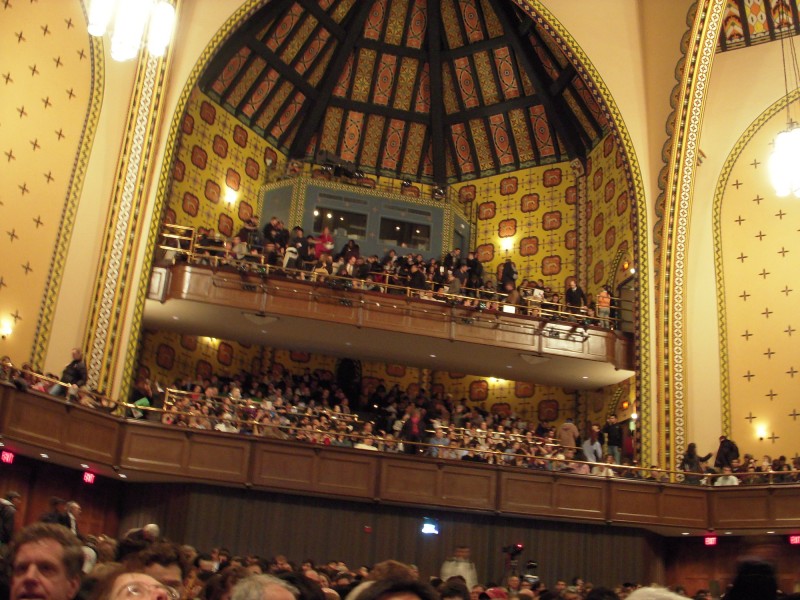We’re all a little (or a lot) flipped out about the economy these days so when Paul Krugman, liberal economist and Princeton prof, 2008 Nobel Prize winner in economics and widely-read columnist (and blogger) for the New York Times came to Penn to give the 2009 Goldstone Forum lecture last Wednesday, people (including me and Steve) turned out hungry for some words of wisdom to penetrate the gloom.
There was plenty of wisdom, some quips and lots of economics explication from Krugman but optimism there was none. And in the hour-long talk and Q&A the economist used It’s not enough as his mantra about the new economic stimulus package, the TARP provisions and lowering interest rates. The message from Krugman — and he apologized for not being able to deliver even one bright spot — is that we’re temporarily cooked, and that what we have now is not all that different in framework from what we had in 1928 when the banks collapsed and we had the Great Depression (GD).
I found one ring to grab in the talk — politics. Krugman said that politics was making recovery worse because Congress is deeply divided in their economic outlook and many conservatives (and conservative think tanks like Heritage Foundation) are clinging to fallacies about economics) that stand in the way of clear thinking about what to do. According to Krugman, what’s to do is government spending. That’s the only way to lift us up. And if we can get past the politics (or get those politicians out of there– Yes we Can!!) then we’ll be better able to deal. OK, it’s a long shot. But I’m all for working hard to defeat all those Republicans who voted against the stimulus bill.

Here are some of Krugman’s more salient points:
About our current recession
–This is not your father’s recession–it’s your grandfather’s recession (or, noticing the majority of 20-something students in the hall) your great-grandfather’s recession….
–This is different. There’s no inflation. It’s harder to end recession when it’s this way.
–There’s more than an incidental resemblance to the Great Depression.
Jobs and the global outlook
We’re losing 20,000 jobs a day. It’s more severe in Indonesia and the Baltic states.
How did we get into the crisis?
[I’m paraphrasing here– it’s all economics to me]
–We forgot that inflation could be good
–We placed too much faith in banks,[and banks like Bear Stearns, Lehman Brothers etal failed]
–We forgot about debt deflation
Why this crisis resembles the GD
…Over last year and a half there’s been bank runs…[not in the real world but] mobs of people at their computers clicking mouses…the result is the collapse of liquidity. So it is a banking crisis like the 30s.
What do we do?
[paraphrasing–we’ve done what we can to loosen up monetary policy and interest rates], but it’s not enough.
The great discovery is we’re going back to things my grandfather did to save the economy–government spending….It’s pure John Meynard Keynes It’s amazing how well it reads now. It looks like the world we live in.
The stimulus package
It’s not a bad bill…but overall in the world of sausage making…it’s not big enough.
[paraphrasing] CBO estimates we will have a $2.9 Trillion output gap over the next 3 years. The stimulus package is a $2.9 Billion bill. It’s a small measure…and the gap is rising rapidly. It will be ameliorative …it doesn’t look like a kick start.
How will it end
I’m not worrying about the end times. The model we have is the GD …and it was ended by very large public works program known as World War II. [That was] not just big spending — WWII was 42% of GDP — but people were urged to buy bonds and not spend a lot. People were in good financial shape after WWII. It’s very hard to see a program like that coming along.
How is spending a solution to too much spending?
It’s who’s spending. It matters a lot who borrows. When everyone decides they have too much debt and cuts back…everybody’s hurt. It’s the paradox of thrift. [that’s what’s happening now]
Only government can break the vicious cycle.
Also, how can the debt be paid off unless government comes in.
Was the Iraq war a cause of this
I think [the war] was an outrage. I’m still holding out for a truth and reconciliation commission on it. That said, we’re a big rich country with a huge tax base, and [the war was] not crippling in terms of debt burden.
The crisis was caused by private spending and the banks. If we didn’t have the war, the debt we’d have would be smaller and we’d have more wiggle room. Economics is not a morality play. I don’t think the war had a part in this.





